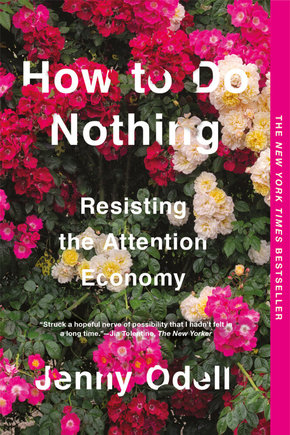How to Do Nothing - Resisting the Attention Economy
| Verlag | Melville House |
| Auflage | 2020 |
| Seiten | 256 |
| Format | 22,7 x 20,8 x 30,8 cm |
| Gewicht | 238 g |
| Artikeltyp | Englisches Buch |
| EAN | 9781612198552 |
| Bestell-Nr | 61219855UA |
__ A New York Times Bestseller __
NAMED ONE OF THE BEST BOOKS OF THE YEAR BY: Time The New Yorker NPR GQ Elle Vulture Fortune Boing Boing The Irish Times The New York Public Library The Brooklyn Public Library
"A complex, smart and ambitious book that at first reads like a self-help manual, then blossoms into a wide-ranging political manifesto." Jonah Engel Bromwich, The New York Times Book Review
One of President Barack Obama's "Favorite Books of 2019"
Porchlight's Personal Development & Human Behavior Book of the Year
In a world where addictive technology is designed to buy and sell our attention, and our value is determined by our 24/7 data productivity, it can seem impossible to escape. But in this inspiring field guide to dropping out of the attention economy, artist and critic Jenny Odell shows us how we can still win back our lives.
Odell sees our attention as the most precious and overdrawn resource we have. And we must actively and continuously choose how we use it. We might not spend it on things that capitalism has deemed important but once we can start paying a new kind of attention, she writes, we can undertake bolder forms of political action, reimagine humankind s role in the environment, and arrive at more meaningful understandings of happiness and progress.
Far from the simple anti-technology screed, or the back-to-nature meditation we read so often, How to do Nothing is an action plan for thinking outside of capitalist narratives of efficiency and techno-determinism. Provocative, timely, and utterly persuasive, this book will change how you see your place in our world.
Leseprobe:
How to Do Nothing: Resisting the Attention Economy
Chapter 2 The Impossibility of Retreat
A lot of people withdraw from society, as an experiment So I thought I would withdraw and see how enlightening it would be. But I found out that it s not enlightening. I think that what you re supposed to do is stay in the midst of life.
AGNES MARTIN
If doing nothing requires space and time away from the unforgiving landscape of productivity, we might be tempted to conclude that the answer is to turn our backs to the world, temporarily or for good. But this response would be shortsighted. All too often, things like digital detox retreats are marketed as a kind of life hack for increasing productivity upon our return to work. And the impulse to say goodbye to it all, permanently, doesn t just neglect our responsibility to the world that we live in; it is largely unfeasible, and for good reason.
Last summer, I accidentally staged my own digital detox retreat. I was on a solitary trip to the Sierra Nevada to work on a project about the Mokelumne River, and the cabin I had booked had no cell reception and no Wi-Fi. Because I hadn t expected this to be the case, I was also unprepared: I hadn t told people I would be offline for the next few days, hadn t answered important emails, hadn t downloaded music. Alone in the cabin, it took me about twenty minutes to stop freaking out about how abruptly disconnected I felt.
But after that brief spell of panic, I was surprised to find how quickly I stopped caring. Not only that, I was fascinated with how inert my phone appeared as an object; it was no longer a portal to a thousand other places, a machine charged with dread and potentiality, or even a communication device. It was just a black metal rectangle, lying there as silently and matter-of-factly as a sweater or a book. Its only use was as a flashlight and a timer. With newfound peace of mind, I worked on my project unperturbed by the infor mation and interruptions that would have otherwise lit up that tiny screen every few minutes. To be sure, it gave me a valuable new perspective on how I use technology. But as easy as it was to romanticize giving everything up and living like a hermit in this isolated cabin, I knew I eventually needed to return home, where the world waited and the real work remained to be done.

